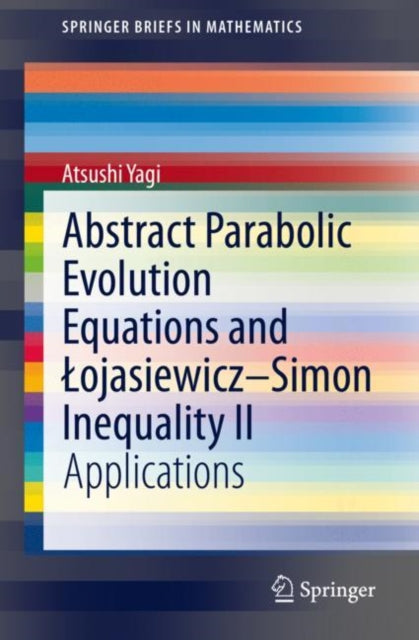Atsushi Yagi
Abstract Parabolic Evolution Equations and Lojasiewicz-Simon Inequality II: Applications
Abstract Parabolic Evolution Equations and Lojasiewicz-Simon Inequality II: Applications
YOU SAVE £9.19
- Condition: Brand new
- UK Delivery times: Usually arrives within 2 - 3 working days
- UK Shipping: Fee starts at £2.39. Subject to product weight & dimension
Bulk ordering. Want 15 or more copies? Get a personalised quote and bigger discounts. Learn more about bulk orders.
Couldn't load pickup availability
- More about Abstract Parabolic Evolution Equations and Lojasiewicz-Simon Inequality II: Applications
The second volume of this book continues the study of asymptotic convergence of global solutions of parabolic equations to stationary solutions by utilizing the theory of abstract parabolic evolution equations and the Łojasiewicz–Simon gradient inequality. It presents applications to concrete parabolic equations, including semilinear parabolic equations, epitaxial growth equations, and Keller–Segel equations. Readers should have a standard-level knowledge of functional analysis and function spaces, and familiarity with functional analytic methods for partial differential equations.
Format: Paperback / softback
Length: 128 pages
Publication date: 13 August 2021
Publisher: Springer Verlag, Singapore
This second volume continues the study on asymptotic convergence of global solutions of parabolic equations to stationary solutions by utilizing the theory of abstract parabolic evolution equations and the Łojasiewicz–Simon gradient inequality. In the first volume of the same title, after setting the abstract frameworks of arguments, a general convergence theorem was proved under the four structural assumptions of critical condition, Lyapunov function, angle condition, and gradient inequality. In this volume, with those abstract results reviewed briefly, their applications to concrete parabolic equations are described. Chapter 3 presents a discussion of semilinear parabolic equations of second order in general n-dimensional spaces, and Chapter 4 is devoted to treating epitaxial growth equations of fourth order, which incorporate general roughening functions. In Chapter 5 consideration is given to the Keller–Segel equations in one-, two-, and three-dimensionalspaces. Some of these results had already been obtained and published by the author in collaboration with his colleagues. However, by means of the abstract theory described in the first volume, those results can be extended much more. Readers of this monograph should have a standard-level knowledge of functional analysis and of function spaces. Familiarity with functional analytic methods for partial differential equations is also assumed.
In this second volume, the exploration of asymptotic convergence of global solutions of parabolic equations to stationary solutions takes a significant step forward. Building upon the foundations established in the first volume of the same title, the authors delve deeper into the realm of abstract parabolic evolution equations and the Łojasiewicz–Simon gradient inequality. These tools provide a powerful framework for analyzing and understanding the behavior of parabolic equations.
In the first volume, the authors laid the groundwork by establishing abstract frameworks of arguments. Within these frameworks, they proved a general convergence theorem under four crucial structural assumptions: critical condition, Lyapunov function, angle condition, and gradient inequality. These assumptions serve as the pillars upon which the theory is built, offering a solid foundation for understanding the convergence of solutions.
In this volume, the authors revisit those abstract results, providing a brief review of their significance. They then explore how these results can be applied to concrete parabolic equations, offering practical insights and solutions. Chapter 3 delves into the realm of semilinear parabolic equations of second order in general n-dimensional spaces. The authors examine the behavior and properties of these equations, highlighting their applications in various fields. Chapter 4, on the other hand, focuses on treating epitaxial growth equations of fourth order, which incorporate general roughening functions. These equations arise in diverse areas such as physics, biology, and materials science, and the authors provide comprehensive analysis and solutions.
Chapter 5 explores the Keller–Segel equations in one-, two-, and three-dimensional spaces. While some of these results had already been obtained and published by the author in collaboration with his colleagues, the abstract theory described in the first volume opens up new avenues for extending and enhancing those results. By leveraging the power of the abstract framework, the authors demonstrate the potential for expanding our understanding of parabolic equations and their applications.
It is important to note that this monograph assumes a standard-level knowledge of functional analysis and function spaces. Additionally, familiarity with functional analytic methods for partial differential equations is assumed, as these methods play a crucial role in the analysis and solution of parabolic equations.
In conclusion, this second volume of the same title continues the groundbreaking work of the authors in the field of asymptotic convergence of global solutions of parabolic equations to stationary solutions. By employing abstract parabolic evolution equations and the Łojasiewicz–Simon gradient inequality, the authors have expanded the horizons of our understanding and provided valuable insights into concrete parabolic equations. This monograph is a valuable resource for researchers, scholars, and practitioners interested in the study of parabolic equations and their applications.
Weight: 226g
Dimension: 235 x 155 (mm)
ISBN-13: 9789811626623
Edition number: 1st ed. 2021
This item can be found in:
UK and International shipping information
UK and International shipping information
UK Delivery and returns information:
- Delivery within 2 - 3 days when ordering in the UK.
- Shipping fee for UK customers from £2.39. Fully tracked shipping service available.
- Returns policy: Return within 30 days of receipt for full refund.
International deliveries:
Shulph Ink now ships to Australia, Belgium, Canada, France, Germany, Ireland, Italy, India, Luxembourg Saudi Arabia, Singapore, Spain, Netherlands, New Zealand, United Arab Emirates, United States of America.
- Delivery times: within 5 - 10 days for international orders.
- Shipping fee: charges vary for overseas orders. Only tracked services are available for most international orders. Some countries have untracked shipping options.
- Customs charges: If ordering to addresses outside the United Kingdom, you may or may not incur additional customs and duties fees during local delivery.


